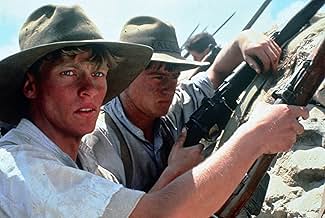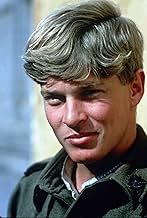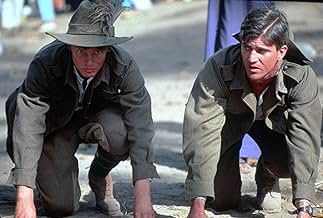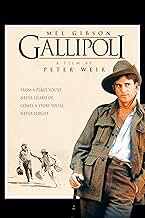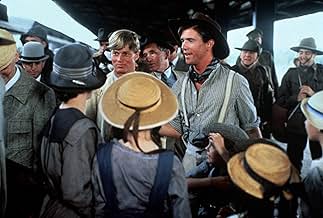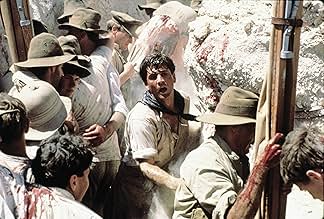Gallipoli
- 1981
- Tous publics
- 1h 50m
IMDb RATING
7.4/10
44K
YOUR RATING
Two Australian sprinters face the brutal realities of war when they are sent to fight in the Gallipoli campaign in Turkey during World War I.Two Australian sprinters face the brutal realities of war when they are sent to fight in the Gallipoli campaign in Turkey during World War I.Two Australian sprinters face the brutal realities of war when they are sent to fight in the Gallipoli campaign in Turkey during World War I.
- Awards
- 11 wins & 6 nominations total
Charles Lathalu Yunipingu
- Zac
- (as Charles Yunupingu)
- Director
- Writers
- All cast & crew
- Production, box office & more at IMDbPro
Featured reviews
Once again, I've had the pleasure of showing this film to one of my College literature classes; we're studying the World War One poets of England, and this film shows my students in vivid detail what made this war so different from anything that had come before it. The world lost its innocence with "The Great War," and we are still reeling from the consequences a century later. Peter Weir's magnificent film follows the story of two best "mates" from the Australian outback and their sudden thrust into the realities of a new world order. Mel Gibson, Mark Lee, and a fine cast create the sense of brotherhood and horror that makes this film so profoundly moving. The last 20 minutes spares the audience no detail, and while more recent films like "Black Hawk Down" and "Saving Private Ryan" are perhaps more graphic, "Gallipoli" immerses us in the human loss more fully. In "Gallipoli" we get to know these friends in intimate detail, making the losses they suffer in the end truly gut wrenching. Five stars out of five stars.
Filmed in a period of cinematographic transition, between, on the first hand, the old Hollywood productions like The Longest Day (Ken Annakin and 4 others, 1962), A Bridge Too Far (Richard Attenborough, 1977) or The Great Escape (John Sturges, 1963) sometimes completely disconnected from the reality and the atrocities perpetrated on the battlefield by both sides and, on the other hand, darker and immeasurably more realistic productions from the late 70s, such as Come and See (Elem Klimov, 1985), The Deer Hunter (Michael Cimino, 1978), Das Boot (Wolfgang Petersen, 1981) and Le vieux fusil (Robert Enrico, 1975).
Indeed, if the first part of this movie is of a distressing insouciance, the two main protagonists striving to leave Australia to join the peninsula of Gallipoli, Turkey, like two children expecting their next summer camp, the second part is cold and raw, unbridled and cruel. In this respect, the film is appropriately lulled by the album Oxygène (Jean-Michel Jarre, 1976) for the sequences full of hope and carefree, camaraderie and friendship and the adagio of Albinoni (Remo Giazotto, 1945) for the poignant sequences of courage and sacrifice.
A moving film with a neat realization and an excellent cast.
Indeed, if the first part of this movie is of a distressing insouciance, the two main protagonists striving to leave Australia to join the peninsula of Gallipoli, Turkey, like two children expecting their next summer camp, the second part is cold and raw, unbridled and cruel. In this respect, the film is appropriately lulled by the album Oxygène (Jean-Michel Jarre, 1976) for the sequences full of hope and carefree, camaraderie and friendship and the adagio of Albinoni (Remo Giazotto, 1945) for the poignant sequences of courage and sacrifice.
A moving film with a neat realization and an excellent cast.
A "Johnny Turk" here, as they say in the movie, just watched the movie and I am very much under the effect of it. I loved the movie, I think they portrayed the senselessness of the war very effectively without making any side the villain. As obvious to anyone watching the movie, the Australians were the victims in the truest sense of the word. They died so needlessly for a cause that was not their own. When I was a kid my mother would always tell me that they were tricked into joining the war thinking they would get to see Europe. So the sentiment in Turkey about Australians and New Zealanders has been favoring them. It was never "what were they doing here!!!! :@" but it was "what were they doing here :(((((" and we love it that Australians still care so much that they come back to visit the land every year in scores whereas I am ashamed to say I haven't been to Gallipoli yet. One thing not so obvious from the movie is that just as it was not the Australians' war to fight, it was not the Turks' war to fight either. In the movie they keep referring to the Ottoman Empire as Turkey. It may seem small but it is a crucial difference because the very reason that Turks took part in the war was because some blind ottoman officers could not face the truth, couldn't see that Ottoman Empire was living its final days and they were blinded by the prospect of the "good old days" that they had to drag the country down with their grandiosity complex.
Ataturk was in Gallipoli. After everything he said these words that have been embraced by the Turks towards our Anzac brothers: "Those heroes that shed their blood and lost their lives... you are now lying in the soil of a friendly country. Therefore, rest in peace. There is no difference between the Johnnies and the Mehmets to us where they lie side by side here in this country of ours... You, the mothers who sent their sons from far away countries, wipe away your tears. Your sons are now lying in our bosom and are in peace. After having lost their lives on this land, they have become our sons as well."
Ataturk was in Gallipoli. After everything he said these words that have been embraced by the Turks towards our Anzac brothers: "Those heroes that shed their blood and lost their lives... you are now lying in the soil of a friendly country. Therefore, rest in peace. There is no difference between the Johnnies and the Mehmets to us where they lie side by side here in this country of ours... You, the mothers who sent their sons from far away countries, wipe away your tears. Your sons are now lying in our bosom and are in peace. After having lost their lives on this land, they have become our sons as well."
Peter Weir has long been one of my favorite directors, and he has had a career consumed by subtle, quiet, lingering films. He can make the most banal concept seem thrilling and suspenseful; a perfect example is the Harrison Ford film "Witness." It could have easily become a stupid, insulting, exploitative "thriller." The ending is, in retrospect, quite ridiculous. But Weir has a strange ability to make anything seem realistic.
"Gallipoli" is one of his older films, from 1981, and it stars a huge cast of names - most famous today, of course, Mel Gibson...whose name is now splattered across the front of the DVD case.
The story is a true one and follows a group of young Australian men who join the ANZACs in World War I. They are sent to Gallipoli, and amidst personal and emotional turmoil they must learn to band together and fight the Turkish Army.
The movie is long, as another reviewer on the site points out. But all of Weir's films are. What I didn't like about his most recent - "Master & Commander" - is that it used special effects (exteriors of ships, etc.) and action sequences (raging storms) to compensate for the slow bits... and came across (to me anyway) as quite dull and down-trodden.
"Gallipoli" is a great film - slow, subtle, low-key. It's a bit like an Australian version of "All Quiet on the Western Front." I'd recommend it to anyone who enjoys slower films and can appreciate character-driven dramas. Don't go near it if your attention span was dimming during "xXx2."
"Gallipoli" is one of his older films, from 1981, and it stars a huge cast of names - most famous today, of course, Mel Gibson...whose name is now splattered across the front of the DVD case.
The story is a true one and follows a group of young Australian men who join the ANZACs in World War I. They are sent to Gallipoli, and amidst personal and emotional turmoil they must learn to band together and fight the Turkish Army.
The movie is long, as another reviewer on the site points out. But all of Weir's films are. What I didn't like about his most recent - "Master & Commander" - is that it used special effects (exteriors of ships, etc.) and action sequences (raging storms) to compensate for the slow bits... and came across (to me anyway) as quite dull and down-trodden.
"Gallipoli" is a great film - slow, subtle, low-key. It's a bit like an Australian version of "All Quiet on the Western Front." I'd recommend it to anyone who enjoys slower films and can appreciate character-driven dramas. Don't go near it if your attention span was dimming during "xXx2."
Terrific film that so succinctly sums up the passion and the innocence of the Aussie soldiers as they gave their lives up for a cause not their own, believing to the end that duty demanded that they make a good showing of themselves. This story is based in historical fact and is still discussed today as one of the most terrible follies foisted upon young men by totally incompetent military leaders. There are even worse stories that are told about the wars outcome in France and Belgium but this film captures enough of the tragedy to drive home the point of how mad all wars are.
The very young and handsome and Aussie sounding Mel Gibson is very convincing as are the entire cast. Peter Weir crafted a heart wrenching film which ends with a moment that you just can not shake from your mind. Great film and very moving.
The very young and handsome and Aussie sounding Mel Gibson is very convincing as are the entire cast. Peter Weir crafted a heart wrenching film which ends with a moment that you just can not shake from your mind. Great film and very moving.
Did you know
- TriviaAlthough he is wears an AIF uniform, Colonel Robinson is often mistaken for an Englishman because he has a clipped Anglo-Australian accent, typical of the time.
- GoofsThe Battle of the Nek was not a diversion for the British landing at Suvla, it was a diversion for an attack by New Zealand attack on Sari Bair.
- Quotes
[first lines]
Jack: What are your legs?
Archy Hamilton: Springs. Steel springs.
Jack: What are they going to do?
Archy Hamilton: Hurl me down the track.
Jack: How fast can you run?
Archy Hamilton: As fast as a leopard.
Jack: How fast are you going to run?
Archy Hamilton: As fast as a leopard!
Jack: Then let's see you do it!
- SoundtracksAdagio in G Minor for Strings & Organ
Composed by Tomaso Albinoni
Performed by Orchestre de Chambre Jean-François Paillard
R.C.A. Records
Details
Box office
- Budget
- A$2,600,000 (estimated)
- Gross US & Canada
- $5,732,587
- Gross worldwide
- $5,738,604
Contribute to this page
Suggest an edit or add missing content


